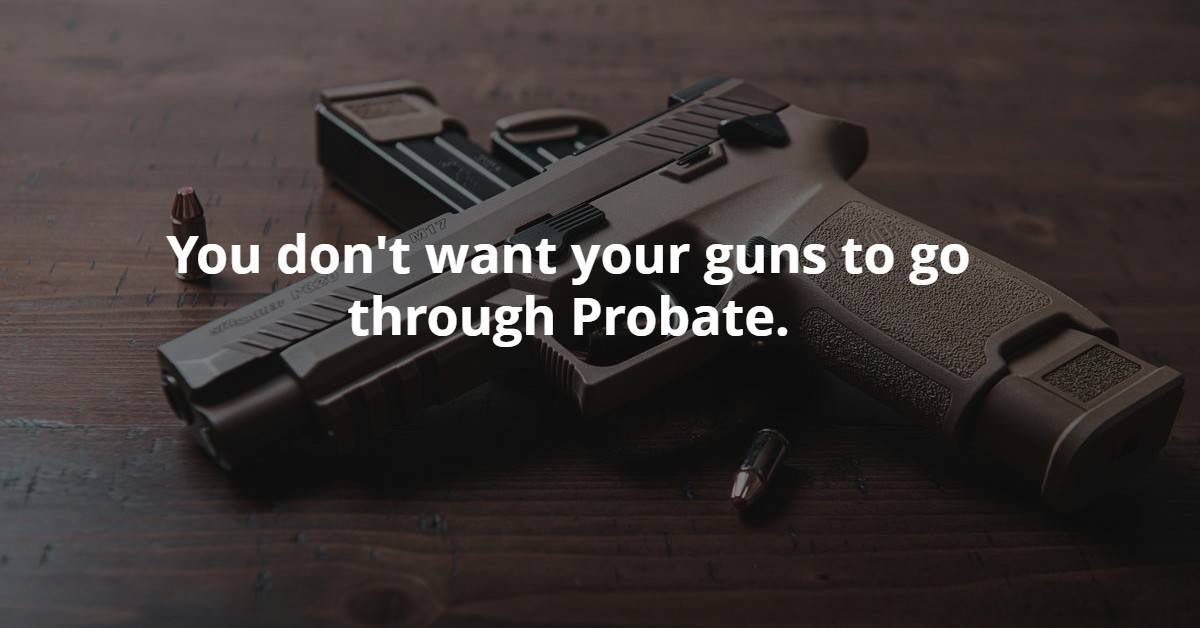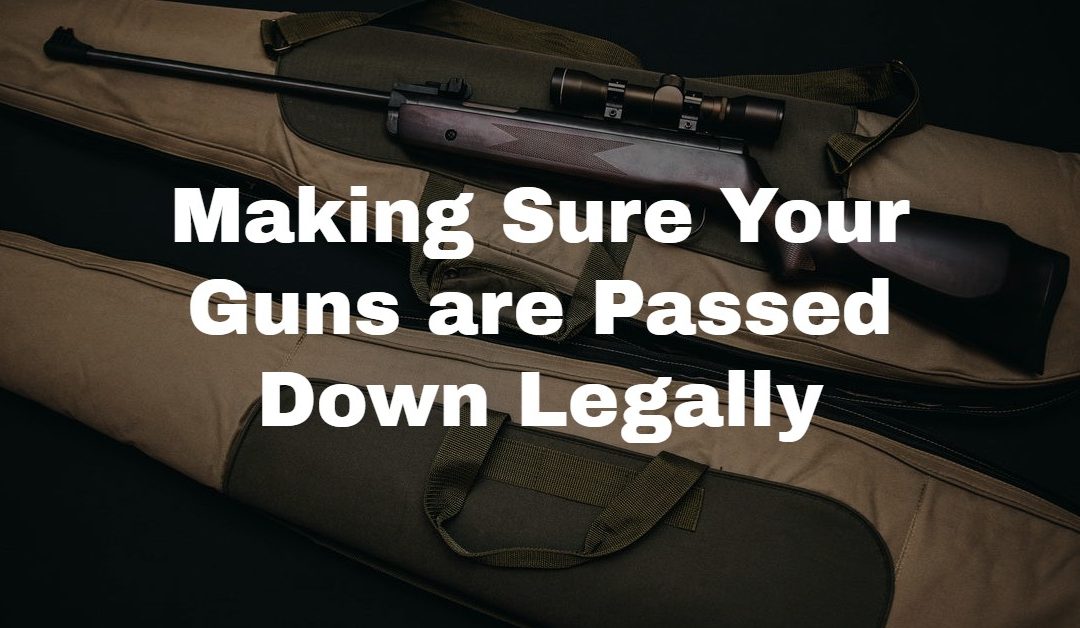Let’s face it — it can be hard to pass down your guns. Firearms are strictly monitored so the government can try to make sure that potentially lethal weapons aren’t in the hands of irresponsible people.
But guns aren’t just utilitarian tools — they’re recreational, valuable, and even family heirlooms. So how do you make sure that your guns are passed down responsibly, safely, and legally?
The best way to achieve this is through a gun trust.
This may seem simple, but due to federal and state legislation, a gun trust can create specific challenges that need the attention of a qualified attorney to handle.This is for a simple reason: unlike most forms of property, obtaining a gun through a gun trust can be a felony in some circumstances.
Creating firearms trusts in particular require careful attention to state and federal details, and sometimes even simple words such as “transfer” can be seen as having different definitions in different documents.
Of course, when the stakes are so high, it can be a little daunting to even begin creating a gun trust. Keep in mind that these laws, while complicated, were created to protect your property. They help carry out your intentions after you’ve passed away.
This guide isn’t a legal document and does not address every issue that you can bump into when you’re developing a gun trust. What it can do, however, is provide a summary of what gun trusts are, how they can help you, and how a lawyer can assist in making sure this process is effective and easy.
A gun trust will contains have its own name, and depending on how it is set up, it may have its own tax ID number. It may also have an inventory of the items held by the trust, a list of people who are in charge of the trust, and instructions for distributing the property owned by the trust.
It will also provide guidance on how to administer the trust, including who the “responsible persons” are for the trust. Funding instructions, information about the assets, and how the contents of the trust should be transferred will all be outlined.

Okay. We got through it. That’s all your gun trust really does. It’s a purpose-driven trust, and the purpose is to protect firearms and loved ones that might want to enjoy those firearms. It possesses your firearms, contains information on who can obtain your firearms, gives clear instructions on their administration, and discusses the trust’s maintenance.
What seems to be a book-sized stack of paper filled with legal jargon is just a guidebook on what property you’re protecting, to whom it should be given, how it supports itself, and how you want it handled.
Gun trusts are kind of like making sushi. It seems simple, and you can see all of the components, but you really need the right chef to pull it off. Now that you know what your gun trust does, we can move forward to what your “chef,” in this case your lawyer, is going to do for you.
Distinctions About Different Firearms
We should start by wading through some of the distinctions about different firearms as the law sees it. The first component to understand is the difference between a Non-NFA Firearm and an NFA Item. Non-NFA firearms include rifles, pistols, and shotguns.
NFA firearms are machine guns and additives such as silencers or suppressors, and includes the phrase “any other weapon.” These categorizations create differences in what you can put in a trust without registry or background checks. Your lawyer is going to know the specifics about what forms are responsible, who needs to be checking, and what firearms or accessories are protected and considered in your state.
Gun trusts are often used to obtain non-NFA firearms, such as rifles, pistols, and shotguns. A trust can directly acquire non-NFA firearms, and can possess firearms lawfully with an assignment or bill of sale. The caveat, however, is that state laws individually determine requirements for firearm possession or transfer, including possession and transfer by and to trusts. To properly determine your trust’s legal status, you need to hire an experienced lawyer who practices in your state.
Since 2016, there’s been a change in the acquisition of NFA items. This means two things for you. Firstly, if you made your gun trust before 2016, there may be parts of your trust that need updating— some of your documents may have outdated clauses that can leave your loved ones at risk.
Secondly, it means that there’s a new set of forms and documents that are required for your gun trust. If there is ever a discrepancy between your trust’s language and the law, the law will always win out, even if your trust was made properly at the time you formed it. Ongoing maintenance with an attorney can be a game changer, allowing you to feel confident that your trust protects your loved ones.
Don’t worry. If this seems complicated, remember: your gun trust just tells people who can get your property, when they can get it, and how they’ll get it.
A gun trust is the best way to acquire and possess firearms and accessories in the world of inheritance, and to share them while protecting your loved ones against an accidental felony. Sharing a firearm improperly can result in an unlawful possession or transfer of a firearm, when you really didn’t do anything intentionally wrong.
There are several states that impose criminal penalties for the transfer of firearms between individuals without a background check or a statutory exclusion or exception, regardless of the NFA or non-NFA status of the gun. Having benefactors to your trust from across state lines can create legal issues if not properly handled, and require careful legal understanding.
The main task of the Grantor, or creator of the trust, is to focus on possession and transfer. Who’s going to get your guns, and why? Specific rights and powers will be reserved to you, as the Grantor, and can be given to nobody else. At any point at which you, the Grantor, decide you want to change your gun trust, you can do so through an amendment process with your attorney.
Specify Your Beneficiaries
In the articles of your trust, you need to specify your trust beneficiaries. These beneficiaries are individuals who are entitled to the contents of the trust. Lifetime Beneficiaries are individuals who have access to the trust’s contents under the Trustee’s authority. Basically, they’re people who also have access to the trust, but may not be in charge of “handling” it.
An NFA firearm is required to be under a Trustee’s possession at all times. There is also the option to make your trust state that certain people to have access to your trust property during your lifetime, instead of just after you’ve passed away. That means a family gun does not need to be locked away and can still be used, despite being included in a trust. If you wanted to use a special written memorandum to gift a firearm or accessory to someone, that is also allowed. A firearms and accessories memorandum is customized for personal property, and allows you to gift your firearm.
In the world of gun trusts, there are big consequences for making honest mistakes. But this doesn’t mean that it should be stressful to navigate this process. A good lawyer will make this a smooth process that boosts your confidence about how your firearms will be handled.
 And if you’re still waffling on whether you should commit to this process, here’s the real scoop. You probably don’t want your guns to go through probate, which may be your only other option. A trust protects them from going through this process, which could make information about your guns and other assets publicly available.
And if you’re still waffling on whether you should commit to this process, here’s the real scoop. You probably don’t want your guns to go through probate, which may be your only other option. A trust protects them from going through this process, which could make information about your guns and other assets publicly available.
A Will must go through the probate process, and because of this, merely stating that you intend for someone to receive your firearms in a Will may not provide the same protection. Trusts don’t go through the probate process at all, and allow you to give your assets, including your firearms, to the people you intend for them to be sent to.
During your lifetime, working to preserve your legacy can mean your family and those you care about can enjoy the memories you’ve created for years to come. If you’re serious about your loved ones inheriting your firearms, you should look to develop a proper gun trust.
At Hopler, Wilms, and Hanna, we believe that defining your legacy is your right. Because of this belief, we make the gun trust process simple. Our attorneys and paralegals are experienced with handling and developing trusts, wills, and codicils. We even handle that infamous probate process.
If you’d like to get started on protecting your legacy, or if you’re facing any question about estate planning, administration, or litigation, contacting us by phone, email, or through our website. We’ve handled this before and are confident in our results.


